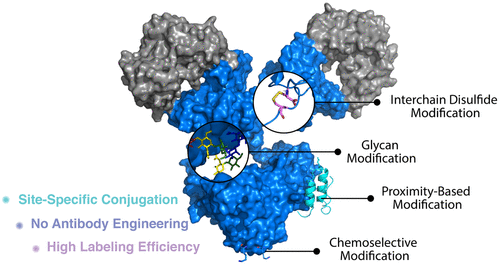当前位置:
X-MOL 学术
›
Bioconjugate Chem.
›
论文详情
Our official English website, www.x-mol.net, welcomes your
feedback! (Note: you will need to create a separate account there.)
Precision Modification of Native Antibodies
Bioconjugate Chemistry ( IF 4.0 ) Pub Date : 2021-08-24 , DOI: 10.1021/acs.bioconjchem.1c00342 Kuan-Lin Wu 1 , Chenfei Yu 1 , Catherine Lee 1 , Chao Zuo 1 , Zachary T Ball 1 , Han Xiao 1, 2, 3
Bioconjugate Chemistry ( IF 4.0 ) Pub Date : 2021-08-24 , DOI: 10.1021/acs.bioconjchem.1c00342 Kuan-Lin Wu 1 , Chenfei Yu 1 , Catherine Lee 1 , Chao Zuo 1 , Zachary T Ball 1 , Han Xiao 1, 2, 3
Affiliation

|
Antibodies, particularly of the immunoglobulin G (IgG) isotype, are a group of biomolecules that are extensively used as affinity reagents for many applications in research, disease diagnostics, and therapy. Most of these applications require antibodies to be modified with specific functional moieties, including fluorophores, drugs, and proteins. Thus, a variety of methodologies have been developed for the covalent labeling of antibodies. The most common methods stably attach functional molecules to lysine or cysteine residues, which unavoidably results in heterogeneous products that cannot be further purified. In an effort to prepare homogeneous antibody conjugates, bioorthogonal handles have been site-specifically introduced via enzymatic treatment, genetic code expansion, or genetically encoded tagging, followed by functionalization using bioorthogonal conjugation reactions. The resulting homogeneous products have proven superior to their heterogeneous counterparts for both in vitro and in vivo usage. Nevertheless, additional chemical treatment or protein engineering of antibodies is required for incorporation of the bioorthogonal handles, processes that often affect antibody folding, stability, and/or production yield and cost. Accordingly, concurrent with advances in the fields of bioorthogonal chemistry and protein engineering, there is growing interest in site-specifically labeling native (nonengineered) antibodies without chemical or enzymatic treatments. In this review, we highlight recent strategies for producing site-specific native antibody conjugates and provide a comprehensive summary of the merits and disadvantages of these strategies.
中文翻译:

天然抗体的精密修饰
抗体,特别是免疫球蛋白 G (IgG) 同种型抗体,是一组生物分子,广泛用作亲和试剂,用于研究、疾病诊断和治疗的许多应用。大多数这些应用需要用特定的功能部分修饰抗体,包括荧光团、药物和蛋白质。因此,已经开发了多种用于抗体共价标记的方法。最常见的方法将功能分子稳定地连接到赖氨酸或半胱氨酸残基上,这不可避免地导致无法进一步纯化的异质产物。为了制备同质抗体缀合物,通过酶处理、遗传密码扩展或遗传编码标签,在位点特异性地引入生物正交手柄,然后使用生物正交缀合反应进行功能化。事实证明,所得同质产品在体外和体内使用方面均优于异质同类产品。然而,需要对抗体进行额外的化学处理或蛋白质工程来掺入生物正交手柄,这些过程通常会影响抗体折叠、稳定性和/或生产产量和成本。因此,随着生物正交化学和蛋白质工程领域的进步,人们对无需化学或酶处理的位点特异性标记天然(非工程)抗体越来越感兴趣。在这篇综述中,我们重点介绍了生产位点特异性天然抗体缀合物的最新策略,并全面总结了这些策略的优缺点。
更新日期:2021-09-15
中文翻译:

天然抗体的精密修饰
抗体,特别是免疫球蛋白 G (IgG) 同种型抗体,是一组生物分子,广泛用作亲和试剂,用于研究、疾病诊断和治疗的许多应用。大多数这些应用需要用特定的功能部分修饰抗体,包括荧光团、药物和蛋白质。因此,已经开发了多种用于抗体共价标记的方法。最常见的方法将功能分子稳定地连接到赖氨酸或半胱氨酸残基上,这不可避免地导致无法进一步纯化的异质产物。为了制备同质抗体缀合物,通过酶处理、遗传密码扩展或遗传编码标签,在位点特异性地引入生物正交手柄,然后使用生物正交缀合反应进行功能化。事实证明,所得同质产品在体外和体内使用方面均优于异质同类产品。然而,需要对抗体进行额外的化学处理或蛋白质工程来掺入生物正交手柄,这些过程通常会影响抗体折叠、稳定性和/或生产产量和成本。因此,随着生物正交化学和蛋白质工程领域的进步,人们对无需化学或酶处理的位点特异性标记天然(非工程)抗体越来越感兴趣。在这篇综述中,我们重点介绍了生产位点特异性天然抗体缀合物的最新策略,并全面总结了这些策略的优缺点。











































 京公网安备 11010802027423号
京公网安备 11010802027423号